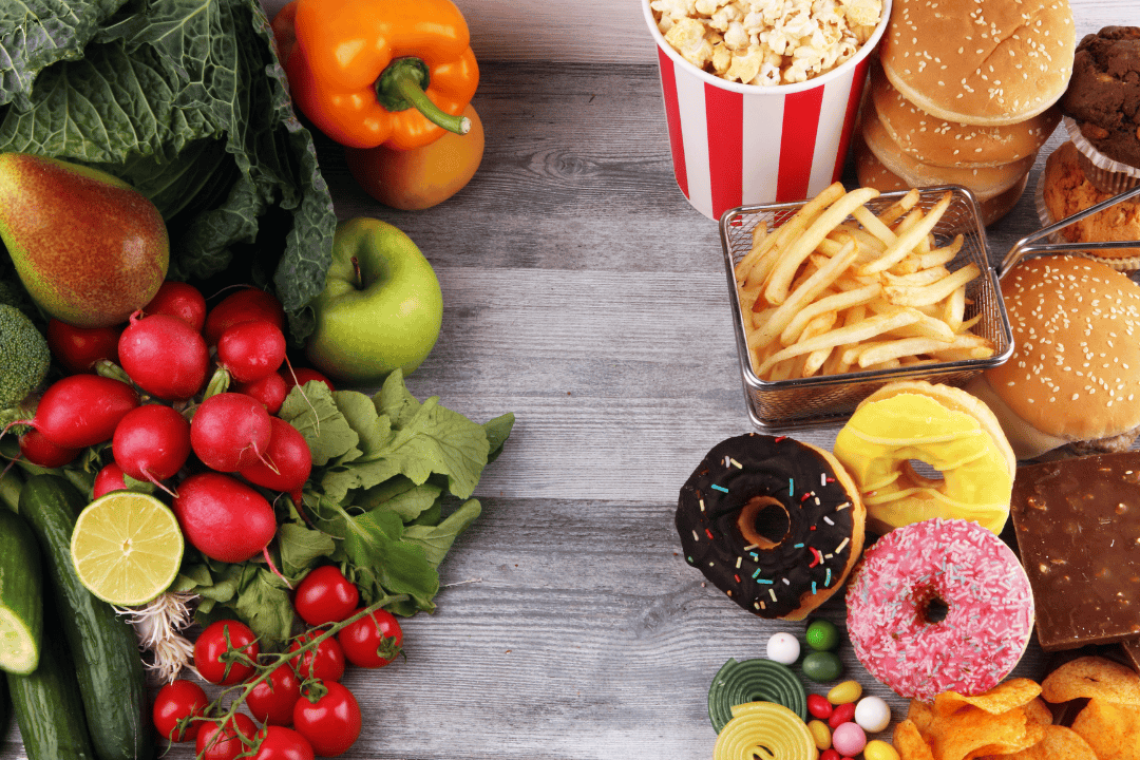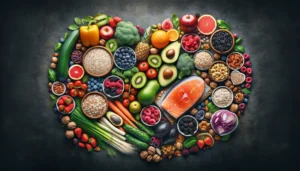Key Takeaways:
- Ultra-processed foods (UPFs) are industrially manufactured foods with added ingredients that often extend shelf life andr enhance flavour.
- High consumption of UPFs has been linked to several health risks, including obesity and heart disease.
- Reducing UPF intake doesn’t have to mean complete avoidance; small changes and informed choices can make a big difference.
Introduction
In recent years, ultra-processed foods (UPFs) have become a significant topic in discussions about diet and health. From packaged snacks to ready-to-eat meals, UPFs have transformed how we eat by offering convenience and flavour-packed options. However, as research delves deeper into the potential health impacts of these foods, questions arise: what exactly makes a food “ultra-processed,” and do these foods pose real health risks? This article aims to break down what UPFs are, how they differ from other types of processed foods, and whether it’s wise to avoid them entirely.
What Are Ultra-Processed Foods?
Ultra-processed foods (UPFs) go beyond simple processing to include a variety of industrial ingredients. Almost all foods undergo some processing. The NOVA food classification system groups all foods according to the processing (physical, biological and chemical techniques) used after foods are separated from nature, and before they are consumed or else made into dishes and meals. UPF often contain ingredients not commonly used in home cooking, such as preservatives, flavour enhancers, colourings, and emulsifiers, which give these foods an appealing taste and longer shelf life. UPF are convenient, attractive options that are highly profitable for the manufacturers. The carbon footprint can be high too.
NOVA classifies all foods and food products into 4 groups.
Group 1: Unprocessed and minimally processed foods
This group contains the edible parts of plants (fruit, veg, grains) and animals (fresh meat, eggs, milk). This group also contains things like mushrooms, seaweeds and water. In order to eat these things easily or in a variety of ways and to keep them fresh, some processing often needs to occur e.g. drying, roasting, boiling, pasteurization, chilling.
Most of this group of foods is healthy stuff that we should be basing our diet on. However, some of the foods and drinks within this category are not ‘every day foods/ drinks’. For example, Dentists wouldn’t be too pleased at us for drinking fruit juice daily.
Tea and coffee is in this group! 🙂
Group 2: Processed culinary ingredients
This group includes oils, butters, sugar and salt as well as things like honey and maple syrup.
The NOVA classification correlates with the healthiness of the food, but shouldn’t be used to classify the the health of a food.
For example, we eat too much sugar and salt. They may be Group 2 and are not UPF but we still need to eat them in moderation. Butter too, it contains 3-6 times more calories than cooked grains and 10 to 20 times more than cooked vegetables. So, tuck into too much butter too often and you’ll likely eat too many calories and your body fat might rise as a result. This rise in body fat, if it rises over what is physiologically healthy for your body, will increase your risk of disease.
Group 3: Processed foods
This group is for the likes of canned/ jars of vegetables, pulses and fish preserved in brine or syrup (oil, salt or sugar basically). These foods aren’t so black and white in terms of how often most people should be consuming them. However, this group also includes the likes of ham and bacon which are foods we should minimise in our diet – put it another way, they are ‘sometimes foods’ not ‘everyday foods’.
This grouping gets more complicated again as it includes most freshly baked bread and cheese. These are not foods that the majority of people need to be avoiding.
Ultimately this group is mainly group 1 foods with some of group 2 added. They are recognisable as group 1 foods and the ingredients list is short enough.
A healthy diet probably consists of mostly group 1 foods with small amounts of group 3 foods and only little bits of group 2 foods.
Group 4: Ultra-processed foods
This group is ultra processed foods. They’re not really stuff you would make at home in your kitchen. They’re often very tasty and not very filling, thereby being easy to overeat. For example, most sugar sweetened beverages, biscuits, cakes, sweets etc… It would also include the likes of most chicken nuggets, pizzas, hot dogs, sausages etc… Generally, we know what we’re eating isn’t the healthiest choice.
Although there has been a rise in UPF foods, they’re not necessarily all new creations. For example, humans have been making jam for quite some time. Also, they’re not all the less healthy option. I mean, baby formula is UPF and that’s not unhealthy. Whey is UPF and is beneficial in some scenarios. Breakfast cereals and fruit yoghurts differ in their degree of healthiness!
Common Examples of Ultra-Processed Foods
Most but not all
- Packaged snacks (crisps, sweets, chocolate bars)
- Breakfast cereals
- Instant noodles and ready-to-eat meals
- Soft drinks and flavoured beverages
- Certain types of bread, cakes, and pastries
Unlike minimally processed foods—such as washed fruits, chopped vegetables, or plain yoghurt—UPFs often lack some of the original food’s natural nutrients. While the ingredients list on a UPF package may include recognisable items, it usually contains various additives designed to replicate flavours and textures that might otherwise be lost in the processing.
Do we need to be constantly reading food labels?
No, we don’t. Firstly, the aim of the game for many of us is to eat more whole foods. Not only would this be healthier for our bodies but also for the planet. We cannot forget the importance of eating a more sustainable diet. A diet rich in UPF is not good for the planet.
Once we’re eating mainly whole foods, then we’re trying to reduce the UPF that has the biggest impact on our health. The 2 ones that we need to be mindful of are sugar sweetened beverages and processed meats. What isn’t healthy is developing anxious thoughts around the foods that we eat and enjoy that comes from packages. Chocolate, when eaten mindfully and when your really want it is a truely healthy experience! Health is more than physical health but mental and social health too, after all. Where I would prefer people’s energy and focus to go is on how they could help themselves eat more Group 1 wholefoods more often. How could most people make healthy eating easier? In order to make headway, most people would benefit from spending more time in the frozen section of the supermarket! The frozen fruit and veg options are fab these days.
Would changing a condiment or spice that you use every few weeks in tiny amounts actually impact your overeall health?
How Ultra-Processed Foods Affect Our Health
The impact of ultra-processed foods (UPFs) on health has become a growing concern, with research linking high consumption of these foods to various health issues. UPFs tend to be high in added sugars, less healthy fats, and salt, while often lacking essential nutrients like fibre, vitamins, and minerals. So, it might not just be what’s in them, but also that they’re eaten instead of wholefoods, which tend to contain lots of naturally super healthy stuff. Here’s a look at some of the primary ways UPFs can affect health:
1. Increased Risk of Obesity and Weight Gain
Studies have shown a strong association between diets high in UPFs and weight gain. These foods are often calorie-dense, not very filling and engineered to be highly palatable, which can lead to overeating and an excess intake of calories. It’s the excess intake of calories that leads to weight gain, not the UPF.
2. Impact on Heart Health
Many UPFs contain trans fats, less healthy saturated fats, salt and sugar, which have been linked to an increased risk of heart disease. However, the two proccessed foods/ drinks causing most of the issues, as per the research, are sugar sweetened beverages and processed meats.
I’m not saying the others don’t matter, but what I am saying is that not everything matters equally.
3. Potential Digestive Issues
UPFs often lack fibre, a key nutrient for healthy digestion. Fibre helps maintain regular bowel movements, supports beneficial gut bacteria, and may reduce the risk of certain digestive disorders. 80% of us don’t eat enough. Diets heavy in UPFs can disrupt the balance of gut bacteria, potentially leading to digestive discomfort and issues over time. Not eating enough fibre has also been linked to an increased risk of developing bowel cancers.
4. Blood Sugar Spikes and Energy Crashes
Many UPFs are rich in sugar and low in fibre, which can cause sharp spikes in blood glucose levels, followed by sudden drops. This “rollercoaster” effect on blood sugar can impact how a person feels day to day. Therefore, eating them often and in place of whole foods, may lead to issues for some people.
5. Increased Cancer Risk
Some studies suggest a possible link between UPF consumption and an increased risk of certain cancers. However, the impact was small, and some of the research within the review was low quality. It’s very hard to prove direct links between specific food groups and health outcomes. Nonetheless, overweight and obesity increases the risk of 13 different cancers.
So, with lots of these things you could argue based on current evidence that it’s easy to overeat UPF and this is what is leading to the bulk of the increased risk of disease. Also, when you’re eating UPF you’re not eating whole foods. I’m not saying that eating lots of industrial ingredients is a good thing, and that I’m promoting it. However, we need the research to show us which of them are less healthy, which are more healthy, and then grade how much they matter. I mean, just because something is unhealthy, doesn’t mean its a big player and worth focusing on. And, just because it’s an industrialised ingredient, doesn’t mean it can’t be healthy.
Should We Avoid Ultra-Processed Foods?
Avoiding ultra-processed foods (UPFs) entirely may not be realistic (or healthy), especially given their convenience and widespread availability. However, limiting UPF intake can be a practical and impactful step towards better health. Here’s a balanced perspective on whether to avoid UPFs and some practical tips for doing so.
The Case for Reducing UPF Intake
While not every ultra-processed food is harmful in moderation, a diet high in UPFs has been associated with negative health outcomes. The highly processed nature of these foods often strips away nutrients while adding ingredients that can be harmful if consumed in excess regularly. Reducing UPFs, even by a small amount, can create more room in the diet for nutrient-rich whole foods, like fruits, vegetables, whole grains, and lean proteins, which offer essential vitamins, minerals, and fibre that support long-term health.
A Practical Approach: Moderation, Not Elimination
Instead of aiming to avoid UPFs entirely, adopting a balanced approach can be both practical and sustainable. A big win would be to reduce sugar sweetened beverages and to eat less processed meats (e.g. ham, rashers and sausages). The goal is to replace some UPFs with whole or minimally processed foods rather than striving for perfection, which can lead to stress and a negative relationship with food.
Mindful Consumption
Another effective strategy is mindful consumption. This involves becoming more aware of how often and why UPFs are chosen. By paying closer attention to cravings, habits, and eating patterns, it’s easier to make conscious choices and limit UPFs without feeling deprived. For example, if UPFs are often a go-to when feeling short on time, then one way to divery behaviours is to use more frozen fruits and vegetables which can make the healthier option more available at least some of the time.
However, it’s worth noting that satisfying taste is incredibly important and food is there to be enjoyed. For example, I know what chocolate is less processed and technically healthier. However, I’m not eating chocolate for health reasons, I’m eating it for taste, so getting the exact brand and type that I enjoy is actually the healthiest choice of all.
Healthier Alternatives to Ultra-Processed Foods
Swapping out ultra-processed foods (UPFs) for whole or minimally processed options doesn’t have to be complicated. Here are some simple, nutritious alternatives that can help reduce UPF intake while still keeping meals convenient and satisfying.
1. Choose Whole Grains Over Refined Options
- Instead of: Instant noodles or white bread
- Try: Whole-grain options like potatoes, oats or wholegrain freshly produced bread. These alternatives are packed with fibre, which supports digestion and helps maintain steady energy levels.
2. Opt for Natural Snacks
- Instead of: Packaged crisps, sweets, or snack bars
- Try: Fresh fruit, nuts, yoghurt, or homemade trail mix. These options provide vitamins, minerals, and healthy fats without added sugars etc…
3. Make Your Own Sauces and Dressings
- Instead of: Pre-made sauces or salad dressings that often contain added sugars, preservatives, and unhealthy fats
- Try: Homemade versions using ingredients like olive oil, vinegar, lemon juice, and fresh herbs. Not only are these more nutritious, but they’re also easy to prepare and can be adjusted to suit personal taste.
4. Hydrate with Water or Natural Beverages
- Instead of: Sugary soft drinks or flavoured beverages
- Try: Water infused with fresh fruits, herbal teas, or sparkling water with a splash of juice. These choices are free from added sugars and artificial additives, helping to reduce daily sugar intake. Also, tea and coffee are healthy too. But, be mindful of how much you’re having and when you’re having it!
5. Go for Fresh or Frozen Produce
- Instead of: Canned or pre-packaged fruits and vegetables with added sugars or preservatives
- Try: Fresh or frozen fruits and vegetables, which retain their nutrients without added ingredients. Frozen produce can be just as nutritious as fresh and often more convenient, especially for those on a tight schedule.
6. DIY Meal Prep for Busy Days
- Instead of: Relying on ready-made meals high in salt and additives
- Try: Batch cooking or preparing simple, whole-food meals in advance. Cooking large portions of staples like soup, stew, or roasted vegetables can provide healthy options throughout the week with minimal effort.
Conclusion
Ultra-processed foods (UPFs) are a convenient part of modern diets, but their potential health risks suggest that it may be beneficial to limit their intake. While most UPFs are not harmful in moderation, and some are healthy to be having daily, research shows that diets high in these foods can increase the risk of obesity, heart disease, and other health issues. Fortunately, avoiding UPFs entirely isn’t necessary to experience positive health benefits. By choosing healthier alternatives, practising moderation, and being mindful of food choices, it’s possible to enjoy a balanced diet that supports long-term well-being.
Remember that being anxious over the food you’re eating can be more damaging to your health than UPF could ever be.
Ultimately, nutrition is about balance rather than strict rules. Reducing UPFs where possible and choosing whole, nutrient-dense foods can help support a healthier lifestyle—one step at a time.
Also – dare I say it – diet isn’t everything! We need to keep a holistic view of health!
FAQs
- What exactly are ultra-processed foods?
Ultra-processed foods (UPFs) are highly processed items containing industrial ingredients like preservatives, flavour enhancers, and added sugars, which are not typically used in home cooking. - Are all processed foods unhealthy?
No. Minimally processed foods, like frozen vegetables, are nutritious. Ultra-processed foods, however, are often high in additives, sugars, and less healthy fats, which may be harmful in large amounts if eaten often. - Can I have UPFs occasionally and still be healthy?
Yes! Eating UPFs occasionally will not harm health. Moderation is key; aim to balance UPFs with plenty of whole, nutrient-rich foods. - Why are UPFs linked to health issues like obesity?
UPFs are often high in calories, not very filling and extremely tasty. Therefore, we can end up overeating and gaining extra fat tissue if we overeat them regularly. - What are some easy food swaps to reduce UPF intake?
Try brown carbs instead of white carbs, and add more fresh/ frozen fruit or veg to meals. - How can I spot UPFs on food labels?
Look for ingredients you wouldn’t use at home, such as artificial colours, emulsifiers, and flavour enhancers. A long ingredient list can also indicate a UPF. However, remember that being anxious over the food you’re eating can be more damaging to your health than UPF could ever be. - Are there any UPFs that are considered safe?
Some UPFs, like fortified plant-based milks, can provide essential nutrients. Also, some breakfast cereals are every day choices. Aim for high fibre varieties (>6g fibre per 100g and <5g of sugar per 100g). - Do ultra-processed foods affect children differently?
When it comes to kids, you’re trying to lay the foundation for how they eat for the rest of their life, and how they may feed future kids. Teaching them how to cook will go a long way. - How can reducing UPFs benefit my health long-term?
Limiting UPFs can support healthy weight, better digestion, lower risk of chronic diseases, and overall improved well-being. - Can a dietitian help me cut down on ultra-processed foods?
Absolutely! A dietitian can offer personalised guidance and practical tips to help reduce UPFs in your diet and find balanced, enjoyable food choices.











